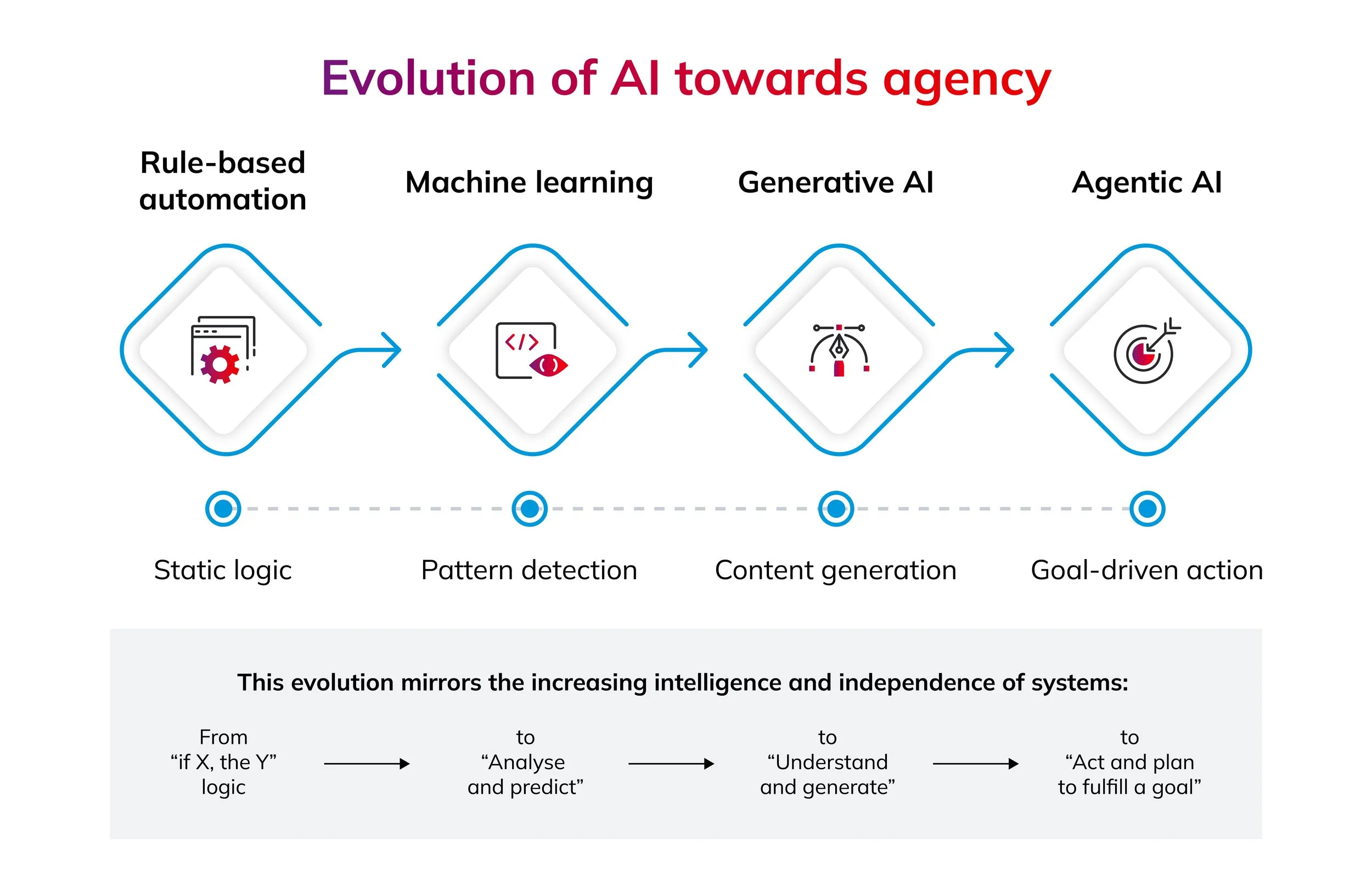Agentic AI vs. AI Agents: Understanding the Future of Autonomous Intelligence
The difference between building intelligence and deploying it could define the next decade of innovation.
A quiet revolution is underway in artificial intelligence...
Until recently, most AI systems waited for us to give them commands. Now, they’re starting to act on their own — analyzing, deciding, and executing tasks without constant supervision.
This new phase of evolution is called Agentic AI — a world where artificial systems don’t just respond, but reason, plan, and act toward their goals.
But before we get lost in the jargon, let’s make something clear:
An AI agent is not the same thing as Agentic AI.
One is a product you can deploy. The other is a philosophy — and a leap forward in what AI can become.
What Is Agentic AI?
Agentic AI refers to the broader field of AI systems capable of acting autonomously and intelligently to pursue goals.
Instead of executing commands line by line, these systems can:
Perceive their environment
Reason about what to do next
Make decisions independently
Learn from experience
Plan across multiple steps
Think of Agentic AI as the intelligence layer — the scientific pursuit of creating AI that can understand, adapt, and act in the real world.
Analogy: Agentic AI is like the field of medicine — the vast science behind how all drugs are researched and developed.
What Is an AI Agent?
An AI agent is a specific application of that intelligence — a software system built to perform a particular task autonomously.
For example:
A customer service chatbot that can resolve support tickets end-to-end.
A sales assistant that qualifies leads and books meetings automatically.
A data analysis agent that pulls reports and turns them into executive summaries.
These agents use the principles of agentic AI — reasoning, planning, and goal-seeking — but within a defined scope.
Analogy: If Agentic AI is the field of medicine, an AI agent is a specific prescription designed to treat a specific problem.
The Relationship Between the Two
Here’s the simple way to remember it:
Agentic AI is the capability.
AI agents are the application.
Agentic AI provides the framework — the ability to sense, think, and act.
AI agents put that ability to work — automating tasks, solving problems, and interacting with humans and systems to achieve results.
All AI agents are powered by agentic principles, but not all agentic AI systems are packaged as agents. Some are research models, others are embedded systems within larger networks.
In short:
-> Agentic AI is the brain.
-> AI agents are the hands.
Why This Matters for Businesses Today
This distinction isn’t just academic — it’s strategic.
For entrepreneurs and leaders, understanding how these systems differ helps you design smarter, safer, and more scalable automation strategies.
At PromptLab, we see three key reasons this matters right now:
1. It’s the Bridge to Full Automation
Current AI tools save time. Agentic AI systems create leverage.
They don’t just help — they handle.
Businesses that embrace agentic capabilities early will have systems that can:
Detect problems before they escalate
Execute repetitive workflows without human hand-holding
Learn and optimize over time
That’s not a productivity boost — it’s an operational upgrade.
2. It Redefines Trust and Control
When AI starts making decisions, the question becomes: who’s really in charge?
Understanding agentic behavior helps organizations design AI governance that balances autonomy with accountability.
That’s why at PromptLab, every automation we build includes guardrails, audit trails, and clear scopes of authority — so your AI systems stay powerful but predictable.
3. It Changes How Teams Work
Once AI can think and act, the role of humans changes too.
Instead of managing tasks, your team starts managing outcomes.
AI agents handle the execution.
People handle creativity, strategy, and connection.
It’s not man versus machine — it’s man with machine.
Agentic AI in the Real World
Here’s what this looks like in practice:
Sales: AI agents qualifying prospects, sending follow-ups, and scheduling demos — while managers focus on relationship-building.
Operations: Agents monitoring supply chains and triggering orders automatically.
Finance: Autonomous systems that reconcile invoices or flag anomalies before audits.
Marketing: Agents that research competitors, test copy, and deploy campaigns autonomously.
Each of these agents is powered by the same principle: goal-seeking intelligence with minimal human guidance.
The PromptLab Perspective
At PromptLab, we build the bridge between theory and practice.
We don’t just talk about agentic AI — we deploy it.
Through custom AI agents and automation workflows, we help businesses bring autonomous systems into their day-to-day operations — safely, strategically, and at the right scale.
Because the future isn’t about replacing people with machines.
It’s about designing intelligent systems that give people more time, more clarity, and more creative capacity.
That’s the true promise of Agentic AI.
Final Thought
The next leap in AI isn’t about intelligence that obeys — it’s about intelligence that understands.
Agentic AI will be remembered as the turning point where technology stopped being a tool — and started becoming a collaborator.
The question is:
Will your business be ready to work with it, or play catch-up once it’s already here?
-> Book a Free Consultation with PromptLab
Discover how agentic AI can streamline your operations, boost output, and build systems that think for themselves — safely and strategically.


